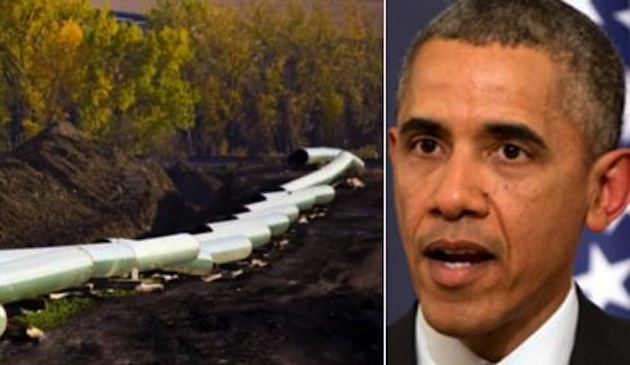

According to a recent ABC News/WaPo poll conducted before the delay, nearly two-thirds of Americans said they support the construction of the Keystone XL pipeline, while a Rasmussen survey conducted this past week found the highest level of support for the project measured to-date.
The last time Republicans benefited from significant union support was in the 1980s, when President Ronald Reagan attracted Teamster support among other national unions. Because of Obama’s political-motivated decision to indefinitely delay the Keystone XL pipeline, an attempt to galvanize the extreme left of the Democratic base, dissension among union leaders and members is growing.
Last week, Terry O’Sullivan, the general president of the Laborers International Union of America (LIUNA), called Obama’s decision “gutless” and characterized it as a “low blow to the working men and women of our country.” Now, O’Sullivan is doubling down on his criticism, adding to the already-quiet rumblings in the Beltway surrounding widening fissures in the Democratic Party before the 2014 midterm elections.
In a Washington Post op-ed, O’Sullivan slammed Obama, suggesting that “the Obama administration grow a set of antlers or take a lesson from Popeye and eat some spinach.” The tidbit of friendly advice refers to the president’s pandering to a small group of radical environmentalists, who oppose the Keystone pipeline no matter the facts.
A State Department review back in late January gave the Keystone XL pipeline the okay, finding no major potential environmental hazards. The report noted that Canadian tar sands are going to be developed regardless of whether or not the U.S. will be the benefactor of the pipeline, and found that other options to get the oil from Canada to Gulf Coast refineries will be worse for the environment. Without the pipeline, the product may get to refineries by other means, including railroads, trucks and barges, which we know emit even more greenhouse gases.
“No one seriously believes that the administration’s nearly-dark-of-night announcement last week, on Good Friday, that the pipeline would again be delayed was anything but politically motivated,” O’Sullivan wrote.
While pundits constantly focus on the Republicans’ troubles appealing to minority voters, a less-known and discussed problem exists for the Democratic Party, which underscores the fluidity of political coalitions. In a still majority white electorate, losing more of the white vote could be a potentially devastating development for the Democratic Party.
In 2012, President Obama lost the white vote to Mitt Romney by a 20-point margin, 59 – 39 percent. In 2008, even though John McCain won the white vote, the margin was a smaller 12-point margin. The long-term trend is even more pronounced. Unions, as you may have guessed, represent a sizable portion of what remains of the white Democratic base. Issues such as the Keystone pipeline, which are economic in nature, coupled with the realignment based on “values” voters, could widen that margin further.
According to a recent ABC News/WaPo poll conducted before the delay, nearly two-thirds of Americans said they support the construction of the pipeline, while a Rasmussen survey conducted this past week found the highest level of support for the project measured to-date. Some Republicans see the opportunity, and aim to exploit it.
The libertarian-leaning Republican Senator from Kentucky, Sen. Rand Paul, recently met with the Teamsters union and reportedly plans now to reach out to Terry O’Sullivan, though PPD can’t confirm those reports are true. It’s understandable why Republicans would think O”Sullivan and others may be receptive to their message. Although unions are an important and historical part of the traditional Democratic coalition, from his op-ed, he seems to understand “energy development is not a right-wing or a left-wing issue. It is critical to our country and to all of us.”
The fissure within the left-wing was highlighted by Keystone, and it is quickly becoming a part of a larger effort to increase the party’s share of the white vote, while at the same time continuing to reach out to minorities.
Whether or not the Republican Party will be successful, is unclear. But what is clear is that if Republicans are even marginally successful, it’s game over. Political obituaries are often written too early, and those post-2012 obituaries apparently were, as well.







